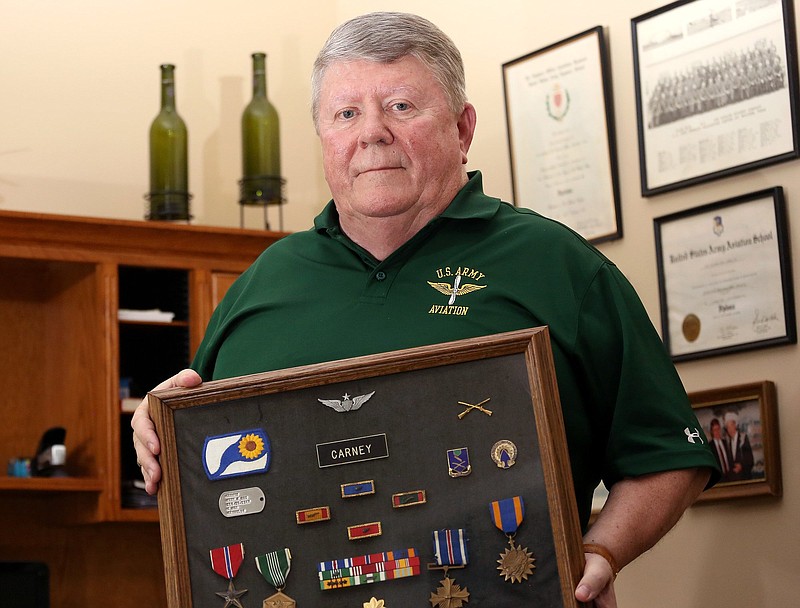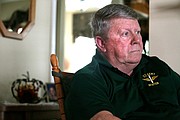BIO
Name: Jack CarneyAge: 71Branch of military: U.S. Air ForceYears of service: October 1967-October 1978
 View our 21 Veteran Salute page
View our 21 Veteran Salute pageBy early 1971, President Richard Nixon wanted out of Vietnam as the casualty counts increased and the protests at home reached massive proportions. The strategy was to "Vietnamize" the war by turning more responsibility over to South Vietnam, declaring victory and then getting out.
But America faced the same problem in February 1971 as it had the previous seven years: How to cut off the Ho Chi Minh Trail, a supply line for North Vietnam that ran from the north, through Laos and Cambodia, before re-entering South Vietnam.
The last, failed attempt to achieve this objective took place for 45 days in 1971 in Operation Lam Son 719 inside Laos. America was not supposed to be in Laos because it was the law that American ground troops could not cross into another sovereign nation to fight, but Jack Carney and his "brothers" from the 48th Assault Helicopter Company weren't ground troops.
"It was exactly like "We Were Soldiers," says Carney of the scenes of Black Hawk helicopters ferrying in troops and supplies while taking out wounded and dead. "My first six months in Vietnam was a vacation compared to Lam Son. It was nothing unusual during that period of 45 days to get shot up and lose aircraft. We were losing people and helicopters every day.
"It was so bad that once you flew back across the Vietnam border, you felt safe. How ironic is that?"
Carney, who would win the Distinguished Flying Cross for his heroism in Operation Lam Son 719, was drafted in 1966 and immediately sought to move to Officer Candidate School because "it was either AWOL or OCS. There was no way I was going to be a private in the Army." Second Lt. Carney became a hospital engineer in Kansas. Detesting the desk work, Carney opted for flight school in 1968 and earned his wings. He deployed to Vietnam in June 1970.
Carney was piloting the second helicopter to land in southern Laos in February 1970. The first, carrying the company commander, went down. Disobeying the protocol to radio in a downed helicopter, Carney and his crew rescued the commander's crew.
"There was never a question about protecting the commander and getting him out of there," says Carney, whose aircraft was later also shot down. "If you got shot down, everyone knew the next guy would be coming to get you."
Lam Son 719 raged for 45 days before the Vietnamese army broke and retreated. A few days after the battle, Nixon announced that "Vietnamization has succeeded."
The 101st Airborne Division lost 84 aircraft, with another 430 damaged during the 45 days. Pilots like Carney flew more than 160,000 sorties, while 19 of Carney's brothers were killed, 59 wounded and 11 missing in action.
"I don't think we (America) actually lost a battle in Vietnam," Carney said. "You would be coming back loaded and getting shot at, but we couldn't return fire until it was cleared that there were no friendlies on the ground. If they are shooting at you, they are not friendlies.
"It bothered me that we were losing people and people were getting killed needlessly. We could have won that war - the pain of losing good friends was unfortunate. Up north in the DMZ (demilitarized zone), when we took off in the morning, you could see the North Vietnam flag flying. We couldn't do anything about it, but it was right there."
Carney, who retired to Chattanooga after a successful career in real estate development and construction, gathers every November with the remaining members of the 48th Assault Helicopter Company. He will miss this year because his new career is doing community service through the Elks Club, and he will be the state president for the organization next year.
"We left Vietnam with about 100 members, and we are down to about 70," says Carney. "We get together, tell stories and drink beer. It's hard to describe how close we became over there. They are my brothers."
Contact David Lundy at news@timesfreepress.com.

